|
|
|
Sort Order |
|
|
|
Items / Page
|
|
|
|
|
|
|
| Srl | Item |
| 1 |
ID:
125091
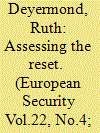

|
|
|
|
|
| Publication |
2013.
|
| Summary/Abstract |
Critics of the Obama administration's 'reset' with Russia claim that it has failed to improve bilateral relations and has conceded too much to Russia at the expense of American interests. In fact, the reset has delivered significant improvements in key areas and established the institutional basis for continued cooperation in the future, benefiting both states. Although disagreements remain on several important issues including missile defence, humanitarian intervention, and democracy, the reset has been broadly successful on its own terms, which were always limited in scope and based on a pragmatic recognition of the limits of possible cooperation. Future progress is uncertain, however - obstacles include differences of national interest; the complicating effects of relations with third party states and the impact of domestic politics. A continuation of the pragmatic approach underpinning the reset represents the best chance for stability in the US-Russia relationship.
|
|
|
|
|
|
|
|
|
|
|
|
|
|
|
|
| 2 |
ID:
086449
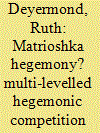

|
|
|
|
|
| Publication |
2009.
|
| Summary/Abstract |
A multi-levelled hegemonic encounter has developed in Central Asia, in which a global hegemon, the USA; a regional hegemon, the Russian Federation; an aspirant sub-regional hegemon, Uzbekistan; and an emergent regional and global hegemon, China, co-exist within the framework of Central Asian security politics. Where these hegemons' interests do not conflict this can be characterised as a matrioshka model of hegemony: the different level hegemons can accommodate one another peacefully and where their interests coincide they can form alliances. The model of multi-levelled hegemony developed here highlights the simultaneous presence of competition and cooperation. This article explores the way in which the various bilateral hegemonic relations in the region also indicate that actual and emergent hegemonic states at different levels can cooperate as hegemons in order to challenge, or to respond to challenge, by hegemonic states at other levels. This helps to clarify the question of whether the increasingly competitive interaction between these states is likely to lead to conflict.
|
|
|
|
|
|
|
|
|
|
|
|
|
|
|
|
| 3 |
ID:
115190
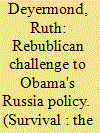

|
|
|
|
|
| Publication |
2012.
|
| Summary/Abstract |
In the two decades since the collapse of the Soviet Union, relations between the United States and Russia have oscillated between optimism and mutual suspicion. The second administration of George W. Bush (2005-09) is widely acknowledged as the lowest point in post-Cold War bilateral relations, with conflict over a range of prominent and sensitive issues such as missile defence, NATO enlargement, the practice and promotion of democracy, and the August 2008 Russia-Georgia War. In the last years of this period, the question of whether this represented the start of a 'new Cold War' was widely discussed.
|
|
|
|
|
|
|
|
|
|
|
|
|
|
|
|
| 4 |
ID:
058484
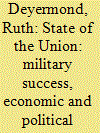

|
|
|
| 5 |
ID:
191746
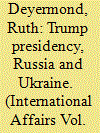

|
|
|
|
|
| Summary/Abstract |
This article examines the Trump administration's policy on Russian aggression in Ukraine and the problem of incoherence in Trump's foreign policy. It argues that the Trump administration's policy on Russia–Ukraine was characterized by incoherence, an absence of clear relationships between the views of senior administration members and official policy, and an unprecedented lack of transparency. Its policy on Russian aggression in Ukraine highlights the unconventional behaviour of the Trump administration as a foreign policy-making body, something which limits the ability of the foreign policy analysis (FPA) field to explain Trump policy. It argues that assumptions about foreign policy and the methods for researching it need to be rethought when administration practices fall so far outside US foreign policy-making norms, particularly in an era when changes in United States domestic politics mean that the Trump administration may not remain a unique case.
|
|
|
|
|
|
|
|
|
|
|
|
|
|
|
|
| 6 |
ID:
147049
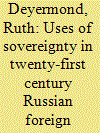

|
|
|
|
|
| Summary/Abstract |
Contemporary Russian foreign policy demonstrates a dual approach to state sovereignty, using a Westphalian model of sovereignty outside the former Soviet region and a post-Soviet model inside it. This approach performs three functions in contemporary Russian foreign policy: securing Russian national interests at domestic, regional, and international levels; balancing against the United States; and acting as a marker of ‘non-Western’ power identity in an emergent multipolar order. The conflict between these two models increasingly appears to threaten the last of these objectives, however, and as a means of advancing foreign policy objectives the approach thus appears caught in a self-defeating logic.
|
|
|
|
|
|
|
|
|
|
|
|
|
|
|
|
|
|
|
|
|